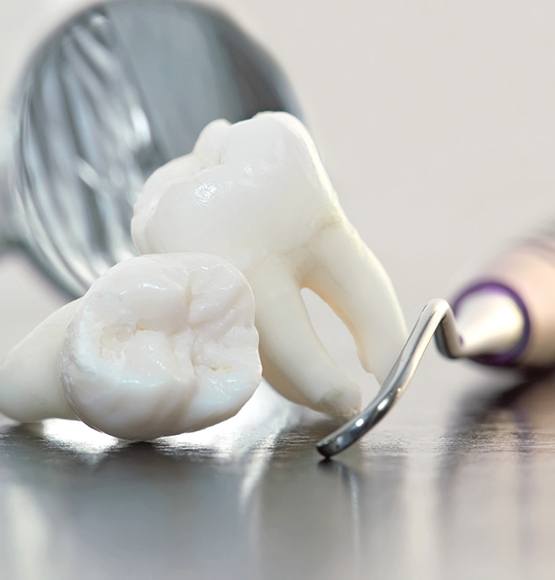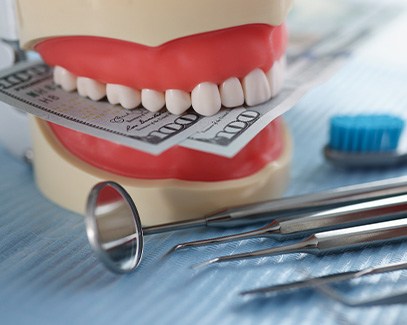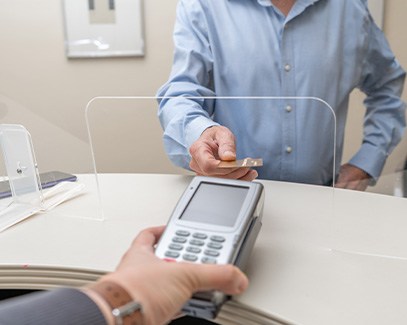Wisdom Tooth Extractions – Tucson, AZ
Safely Removing the Teeth You Don’t Need
Wisdom teeth erupt around the late teens or early twenties – long after every other tooth has already appeared in your mouth. The lack of space can lead to impaction, overcrowding, infections, and severe discomfort. Dr. Lopez can monitor your wisdom teeth to determine whether or not they need to be removed so that they can be extracted before they begin causing serious complications. Call us today to set up a consultation to discuss wisdom tooth extractions in Tucson, AZ for any member of your family that expects their wisdom teeth to erupt in the near future.
Why Choose Dr. Jay Lopez for Wisdom Tooth Extractions?
- Multiple Forms of Sedation Available
- Dentist with Extensive Education & Training
- State-of-the-Art Dental Technology
What are Wisdom Teeth?

Wisdom teeth, sometimes referred to as third molars, are the last teeth to erupt in your mouth, typically between the ages of 16 and 21 years old. While our Paleolithic ancestors 40,000 years ago used these molars to eat tough, raw meats and chew on hard nuts, making them essential to their livelihood; today, wisdom teeth can pose more of a threat than an advantage for some people. That’s why, for preventive measures, many people have their wisdom teeth extracted.
Why Do Wisdom Teeth Need to Be Removed?

Some people might be able to keep their wisdom teeth as long as they don’t cause any problems. An extraction will be necessary if any of the following happens:
- The wisdom teeth remain completely hidden underneath the gums and can’t erupt at all, leading to severe pain.
- The wisdom teeth only partially emerge, making them difficult to clean, which increases the risk of oral infection.
- The wisdom teeth start to crowd and/or damage the rest of your teeth.
The Extraction Process

Your wisdom tooth extraction process will depend on whether you have a simple or surgical procedure. If your teeth have erupted through the gumline, you may only need a simple extraction, which is when your dentist will gently grab and wiggle the tooth free of connective tissue, allowing them to remove it. However, if your third molars are still impacted below the gumline, they may need to make a small incision in order to remove it. In any case, our team will ensure that you’re comfortable throughout the entire process.
Recovering from Wisdom Tooth Removal

Do not rinse vigorously, touch the extraction area, or participate in any strenuous exercise after your treatment. Plan on keeping activity to a minimum for the rest of the day. Call us immediately if bleeding persists after 48 hours. Discomfort should fade after a few days; until then, take pain medication if you need to. Maintain a diet of soft foods for a few days before working your way back to heartier meals at a pace you’re comfortable with.
Understanding the Cost of Wisdom Tooth Extractions

Even if you want a wisdom tooth removed, the process could sound pricey to you. Fair enough – it’s a special treatment that only some practices offer. However, the cost of wisdom tooth extractions varies by the patient; you must consult Dr. Lopez for an exact estimate. Our team will also make your treatment as affordable as possible, guiding you through its pricing factors, dental insurance, and more. Learn the other relevant details by reading below or by calling our office.
Factors That Can Impact the Cost of Wisdom Tooth Extractions

When you first see us for your consultation, our team will give you a thorough oral exam. This step lets us confirm (among other things) the factors that affect your extraction’s cost. Such things include:
- Number of Wisdom Teeth – In general, how many wisdom teeth you need removed will impact your treatment cost. The more that need an extraction, the higher the price of care.
-
Impaction – It costs more to remove impacted wisdom teeth, and the type of impaction affects the overall expense.
- For a soft tissue impaction, treatment costs don’t rise much. It’s still pretty easy to remove a wisdom tooth that’s partly emerged from the gums.
- In contrast, a bony impaction can often prove costly. Treating it means removing a tooth lodged in the jawbone.
- Need for Sedation – You could require sedation during care, depending on whether you need surgical or simple extraction. That said, sedatives would incur an extra cost.
- Specialist Type – If you require a complex wisdom tooth extraction, you’ll likely need an oral surgeon. Having someone like that handle your care will increase your expenses.
Does Dental Insurance Cover Wisdom Tooth Extractions?

Though dental insurance doesn’t always cover wisdom tooth removal, many plans offer at least some benefits. Still, you’ll need to have met your yearly deductible first and consider your maximum. You could also see an in-network dentist to further reduce out-of-pocket costs.
Given the facts above, please call your insurance provider to confirm your benefits before treatment. We’ll gladly assist you with that process if you’d like.
How to Make Wisdom Tooth Extractions Affordable

Whether you have insurance or not, it’s possible to make wisdom tooth extraction affordable. You can just rely on our practice’s payment options for help! Here at Dr. Lopez’s office, we offer services like:
- In-House Membership Plans – For a monthly fee, we’ll give you an annual emergency oral exam and a 15% discount on wisdom tooth extractions.
- Dental Financing – Our practice happens to work with several 3rd party financiers. Through one of them, you could pay for your wisdom tooth extraction in monthly installments.
Removing a problematic wisdom tooth doesn’t have to be a budget-breaking affair. To receive affordable care, just visit our office – we’ll gladly help!
Wisdom Tooth Extractions FAQs

Our team understands that you might have a few questions about wisdom tooth extractions—and we’re here to help! We’ve gathered some of the most commonly asked questions that we receive about wisdom tooth extractions and their respective answers so that you can feel comfortable and confident about committing to the procedure. If you have any other questions about tooth extractions in Tucson, feel free to give us a call for additional information.
Why Do We Have Wisdom Teeth?
Even though it’s usually best to have your wisdom teeth removed these days, they actually served an important purpose for our ancestors. Early humans ate a very coarse diet that consisted of several raw foods like meats, berries, roots, nuts, and other earthy items. They also didn’t cook, prepare, or cut up foods the same way we do today, meaning they needed an extra set of molars to help out their jaws. But since food today is softer and easier to eat, wisdom teeth aren’t really necessary anymore and our jawbones have evolved to not have enough room for them once they erupt.
What Is the Best Age to Get Wisdom Teeth Removed?
Simply put, there’s no specific age that’s best for wisdom tooth extractions; it’s going to depend entirely on your individual circumstances. That said, young adulthood often ends up being the ideal time for many patients. This is because the procedure is usually less complex at this age; if teeth are impacted below the gumline, they can become embedded in the jaw as time passes, risking possible nerve damage if they’re removed when you’re older. It’s also often easier to schedule the procedure and recovery period during the teenage years.
Does Wisdom Tooth Removal Hurt?
The very first thing we’ll do during your wisdom tooth extractions is numb your mouth with a local anesthetic, so pain isn’t something you need to worry about at all! You may feel some slight pressure during the procedure, but it shouldn’t be outright painful. Some patients experience minor soreness or discomfort following the procedure, but as long as you follow the aftercare guidelines you’re sent home with, you’ll feel back to normal within about a week.
What Can I Do to Prepare for Wisdom Tooth Extractions?
Wisdom tooth extractions aren’t something you should take lightly; it’s still an oral surgical procedure that’s meant to set your mouth up for a healthy future. That said, there are many things you can do to prepare yourself, such as:
- Arrange to have someone drive you to and from the appointment, since you won’t be fit to drive after receiving anesthesia. You should also have them keep an eye on you for a few hours following the procedure to ensure that you’re all set.
- Be prepared to let us know what prescribed and over-the-counter medications you take, if any, to avoid unwanted interactions.
- If you’re receiving general anesthesia, avoid eating or drinking after midnight the night before your procedure. Also refrain from smoking for at least 12 hours before the procedure.
- Consider wearing comfortable clothing to your appointment. If you’re receiving IV sedation, wear a shirt with sleeves that are easy to roll up.
- Stock up on plenty of soft foods and liquids; you’re going to need them while your mouth heals up!
Does Everyone Have Wisdom Teeth?
While most people are born with all four wisdom teeth developing in their gums, some people are born with only one, two, three, or none. An article published in the Dental Research Journal in 2015 states that between 5% and 37% of people have fewer than four wisdom teeth. While it’s not completely clear what causes some people to be born with fewer third molars, genetics are likely to be a factor. If one of your parents does not have all four of their wisdom teeth, you may be more likely to be missing at least one of them as well.
However, you may still have wisdom teeth even if you cannot see them, so it may be necessary for us to take X-rays to check for impacted molars. Most people’s third molars begin emerging between the ages of seventeen and twenty-one, but some may begin erupting later or earlier than that.
How Do You Make Wisdom Teeth Pain Go Away?
The only way to permanently resolve the pain caused by troublesome wisdom teeth is to have them removed by a qualified dentist such as Dr. Lopez. However, there are a few home remedies that can reduce your discomfort until then. You can wrap a towel around an ice pack and hold it against the outside of your cheek every few hours for up to twenty minutes at a time to reduce pain. However, it’s important to avoid pressing the ice against your skin, as the cold might damage the tissue. Take over-the-counter pain medication according to the instructions printed on the label to temporarily relieve pain, and you can also use oral numbing gels that contain benzocaine to soothe your gums. Rinsing your mouth with a solution of salt and water can kill bacteria, flush away food debris, and reduce inflammation.
How Soon Can I Eat After Wisdom Teeth Removal?
After having your wisdom teeth removed, it’s best to wait at least an hour before eating. It’s important to keep the gauze pads in your mouth to reduce bleeding during this period, and chewing or drinking hot liquids while your mouth is still numb from the anesthesia can lead to oral injuries. It’s still important to adhere to your dentist’s instructions as to when it is safe to eat again even if you are especially hungry after your procedure. Your mouth will probably be tender for a few days after having your wisdom teeth removed, so it’s important to avoid using straws and stick to a soft diet of foods like smoothies, mashed potatoes, steamed veggies, and pasta. You can gradually reintroduce tougher foods to your diet as you regain your ability to chew them comfortably.
